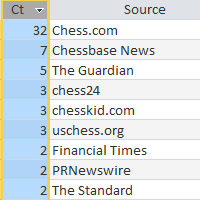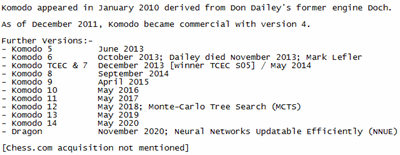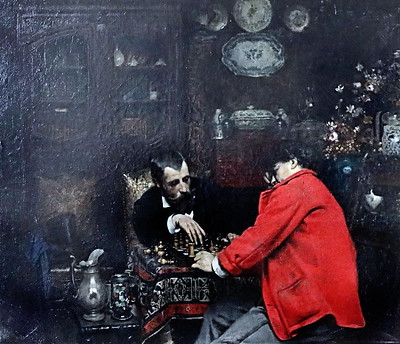USCF Awards 1988-89
Continuing with the most recent post in my current Friday series, USCF Awards 1986-87 (April 2021), let's increment that title to start a new two year cycle. The article quoted in its entirety below, 'America's Chess Community Puts Its Best Foot Forward' by Don Maddox, Chess Life Editor, appeared in the December 1988 issue of CL.
During the U.S. Open each year, the U.S. Chess Federation holds an awards luncheon, to honor members who have made significant contributions to chess. This year in Boston, the tradition was extended.
A quiet hour was set aside on August 13 to consider the enormous gifts of time and labor, received by U.S. Chess from a cadre of dedicated and generous supporters. This year, in recognition of a lifetime of service to chess, former USCF Executive Director Gerry Dullea and Policy Board member Helen Warren were elected Life Voting Members and Delegates-at-Large.
Former USCF President Tim Redman presented the Koltanowski Gold Medal to Fidelty International President Sid Samole for financial support of chess, including contributions to the U.S. Open and the U.S. Championship. Redman also presented the U.S. Chess Distinguished Service Award to Gerry Dullea. for his contributions as Executive Director of the USCF. Other individual awards were presented to David Welsh and Fred Townsend (Special Service) and Harry Lyman (Meritorious Service).
Edgar McCormick of New Jersey received a rousing round of applause as he accepted a commemorative chess set for participating in his 35th U.S. Open.
John McCrary, the Chairman of the USCF Hall of Fame Committee, announced the induction of Hermann Helms and Arpad Elo earlier this year into the U.S. Chess Hall of Fame and Museum. Tne Hall of Fame Committee was recognized as the USCF Committee of the Year. Leisure LINC, Inc., then presented the Hall of Fame with a plaque commemorating GM Arthur Bisguier's historic telecommunications simul, played July 23-24 with 48 players around the country. Three cities were honored as 1988 Chess Communities of the Year: Albuquerque, New Mexico Southfield, Michigan; and Memphis, Tennessee. All three were instrumental in this year's record-shattering scholastic championships.
In his keynote address, William Hall, coach of the New York City District 4 Royal Knights, reviewed, the remarkable history of his successful chess team and issued an invitation to U.S. Chess scholastic players to join District 4 on two scheduled return trips to the Soviet Union in 1989.
In USCF elections, David Saponara of Southern California joined the Policy Board, and several new Regional Vice Presidents assumed their posts: I -- Warren Pinches (MA); II -- Alan Kantor (NY); III -- David Mehler (MD); IV A.J. Goldsby (FL); V -- Gary Kitts (MI); VI -- Tim,Just (IL); VIII -- Mercon Weeks (A); X -- Dennis Glasscock (OK); XI -- Andy Lazarus (N.CA).
In a 6-1 vote, the USCF Policy Board reappointed Don Schultz as FIDE Delegate, unanimously affirming its confidence in his integrity and commending him for faithfully carrying out Policy Board directions. This decision was made in face of rising controversy concerning his alleged role in recent FIDE decisions.
After a thorough executive search and interview process, the Policy Board voted unanimously to appoint Al Lawrence the new USCF Executive Director, a position he had been filling in an interim capacity since March 31, 1988.
That account squares perfectly with the list of 1988 award winners carried each year in the USCF's yearbook. I could have stopped the long excerpt after the mention of 'Communities of the Year' (aka 'Cities of the Year'), but there are a few points worth making on this blog. Undoubtedly the most important is the mention of another M.Weeks, Vice President for region VIII (Mid-South). His state is listed as '(A)'. According to Mercon Weeks Obituary (tributes.com)...
Mercon was born on May 12, 1931 and passed away on Wednesday, April 14, 2010. Mercon was a resident of Mobile, Alabama.
...that state should be listed as '(AL)'. While I was looking for that clarification, I also found Homer Mercon Weeks (1899-1986; geni.com)...
Born: Buffalo, New York; Died: Lufkin, Texas; 'Chess Grand Master, Champion of Southern United States (1940), Champion of Panama, Champion of Cuba and Caribbean'.
...Hmmm. I wonder if he played Capablanca. Someone once told me that all USA Weeks are related, but I'd never heard of Mercon or Homer Mercon before writing this post.
Moving on to 1989, the following full excerpt, titled 'Harmony Prevails at USCF Awards Luncheon' and also by Don Maddox, appeared in the November 1989 CL.
Disagreement is no stranger to the annual U.S. Chess Federation Delegates' meetings. But in Chicago on Saturday, August 12, those of us at the annual Awards Luncheon took a two-hour break from the debates. As USCF President Harold Winston and Executive Director Al Lawrence recognized some of USCF's finest, we readily agreed on how much we owed to those being honored. USCF's fiftieth anniversary cake reminded us of how far we've come together.
Winston recognized two long-serving U.S. Chess volunteers with USCF's highest individual honor, the Distinguished Service Award. Receiving the DSA for a lifetime of dedication and achievement were former USCF Secretary, Treasurer and Vice President Myron Lieberman of Tempe, Arizona; and current FIDE Executive Council member Don Schultz of Highland Beach, Florida.
Lawrence presented Gold Koltanowski Awards, USCF's highest recognition of financial contributions to American chess, to two firms who have given much to chess over the years. Indeed, both corporations have come to our rescue when crucial programs were threatened by lack of funding.
Novag Industries, along with its president Peter Auge, was honored for contributions that include funding the 1988 and 1989 Novag Grand Prix of Chess, a year-long nationwide competition whose goal is to develop more interest in chess. The 1989 Novag Grand Prix offers a $30,000 prize fund. Novag Industries is respected worldwide for its excellence in the field of computer chess and its sponsorship of the Royal Game.
The Software Toolworks, of Chatsworth, California, along with its president Les Crane, received the 1989 Gold Koltanowski award for contributions including sponsorship of The Software Toolworks 1989 U.S. Invitational Championship, The Software Toolworks American Open, and the 1988 U.S. Championship. The Software Toolworks -- a generous supporter of California chess as well as nationwide programs -- produces Chessmaster 2100, the world's leading chess software program.
Outstanding Career Achievement awards were presented to Glenn Petersen, Peter Lahde, Larry Paxton, and Alina Markowski. The Meritorious Service Award was presented to Spencer Matthews of Converse College, South Carolina.
Winston recognized four cities as 1989 Chess Cities of the Year: Knoxville, Tennessee; Tempe, Arizona; Peoria, Illinois; and Seattle, Washington.
After accepting an award for the Scholastic Chess Committee as USCF Committee of the Year, Committee Chairman Mike Nolan announced the 1989 National Scholar Chessplayer Awards: 1st ($ 1,000 scholarship); Doug Enwright; 2nd ($450 scholarship), Eric Troy 3rd ($ 100 each), Ilya Gurevich, Matt Hastings, and Randy Schlegemann.
Ken Marshall reviewed The 1989 Chess Journalist Awards, introducing the other two judges, Roger Blaine and Mike Nolan. The CJA Award winners are listed [elsewhere].
Then, Hall of Fame Committee Chairman John McCrary announced the induction of chess journalist and player Al Horowitz into the U.S. Chess Hall of Fame and Museum. Horowitz, one of America's most prolific chess writers, was cited for his career as a player and'for his editing of Chess Review from 1933 until 1969. Horowitz was U.S. Open Champion in 1936, 1938, and 1943.
Finally, there were three special award winners on this special 50th Anniversary occasion. First was the official "Dean of American Chess" George Koltanowski who was regrettably unable to attend because of his wife's illness. The heartfelt well wishes of USCF members everywhere go out to George and his wife, Leah. Second, former USCF President Marshall Rohland; and finally, founding USCF Director Arpad Elo, who is also the creator of our international rating system.
After receiving a special gift from the Illinois Chess Federation (two bronze replicas of the famous Chicago Art Institute lions) from Helen Warren, Elo treated the assembly to a brief expression of thanks, including an impassioned plea to put aside our differences and take advantage of new opportunities for the advancement of chess in America -- "Keep up the good work, and leave the acrimony and spitefulness behind you." Words of simple wisdom from a man.who has dedicated his life to the betterment of chess everywhere.
Here we find a number of divergences from the official yearbook record. Starting with 'Spencer Matthews of Converse College, South Carolina', winner of the Meritorious Service Award, his award is not listed in the yearbooks. An article in the Google cache, 'Californian captures chess crown' (goupstate.com; 17 July 1989), informs,
The pressure of the U.S. Women’s Chess Championship weighed from beginning to end on Alexey Rudolph. She relaxed last night, after 11 grueling days, as the champion. [...] Spencer Mathews Jr., a psychology professor at Converse and coordinator for the Spartanburg Chess Club’s tournament committee, said Spartanburg showed the world it supports the arts by holding the tournament. For example, he said, "Chess Life" magazine will publish an article about the tournament. [NB: Exact reference?]
Going back a couple of posts to USCF Awards 1984-85 (April 2021), I wondered,
The criteria for a 'Distinguished Service Award' (1985: 'the USCF's highest volunteer honor') as distinct from a 'Meritorious Service Award' is still not clear to me.
Now it's clear. A 'Distinguished Service Award' shined a spotlight on an individual who supported chess through multiple examples of service over many years. A 'Meritorious Service Award' shined a spotlight on a single, notable example of service. For the Koltanowski Award, the yearbook record says,
1989; Gold: Novag Industries, Les Crane
That could be stated more accurately as, e.g.
1989; Gold: Peter Auge (Novag Industries); Les Crane (Software Toolworks)
Another small discrepancy: along with the 'four cities as 1989 Chess Cities of the Year', Lexington, Kentucky is listed in the yearbook. Finally, the three 'special award winners -- Koltanowski (1979, 1986), Rohland (1981), Elo (1979, 1988) -- had all previously received a 'Distinguished Service Award' (the first year I've indicated after each name). A second year after a name indicates a Hall of Fame induction. Where do you go from there when handing out awards?
Next stop in the saga of USCF Awards: 1990-91, except I haven't found a 1990 list published in CL. If I continue to come up empty-handed, I'll look at the yearbooks.
 The summary starts with a small chart like the one shown on the left. It shows all sources that had at least two stories reported by Google News. In April, I counted 101 stories from 51 sources, of which nine sources had more than two stories.
The summary starts with a small chart like the one shown on the left. It shows all sources that had at least two stories reported by Google News. In April, I counted 101 stories from 51 sources, of which nine sources had more than two stories.





